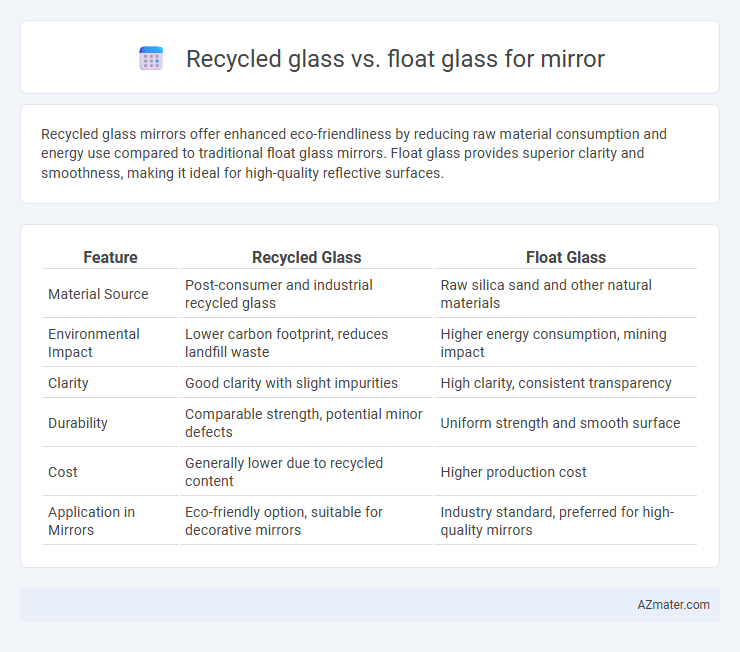Recycled glass mirrors offer enhanced eco-friendliness by reducing raw material consumption and energy use compared to traditional float glass mirrors. Float glass provides superior clarity and smoothness, making it ideal for high-quality reflective surfaces.
Table of Comparison
| Feature | Recycled Glass | Float Glass |
|---|---|---|
| Material Source | Post-consumer and industrial recycled glass | Raw silica sand and other natural materials |
| Environmental Impact | Lower carbon footprint, reduces landfill waste | Higher energy consumption, mining impact |
| Clarity | Good clarity with slight impurities | High clarity, consistent transparency |
| Durability | Comparable strength, potential minor defects | Uniform strength and smooth surface |
| Cost | Generally lower due to recycled content | Higher production cost |
| Application in Mirrors | Eco-friendly option, suitable for decorative mirrors | Industry standard, preferred for high-quality mirrors |
Introduction to Recycled Glass and Float Glass
Recycled glass is produced by melting down post-consumer or post-industrial glass waste, reducing environmental impact and energy consumption compared to traditional methods. Float glass is manufactured by floating molten glass on a bed of molten metal, typically tin, to create a uniform, flat surface ideal for mirrors. While float glass offers superior clarity and smoothness, recycled glass provides a sustainable alternative with comparable properties for mirror applications.
Manufacturing Process: Recycled Glass vs Float Glass
The manufacturing process for recycled glass mirrors involves melting crushed glass cullet at lower temperatures compared to float glass, reducing energy consumption and carbon emissions. Float glass is produced by floating molten glass on a bed of molten tin, creating a uniform thickness and smooth surface essential for high-quality mirrors. Using recycled glass not only conserves raw materials but also integrates sustainable practices in mirror production without compromising optical clarity or durability.
Environmental Impact Comparison
Recycled glass mirrors significantly reduce energy consumption by using up to 60% less energy during production compared to float glass, which relies on melting raw silica sand and soda ash. The reuse of glass cullet in recycled glass lowers raw material extraction and landfill waste, cutting greenhouse gas emissions by approximately 30% relative to float glass manufacturing. Float glass production involves higher carbon footprints due to extensive mining and intensive heat treatment, making recycled glass a more sustainable choice for eco-conscious mirror fabrication.
Quality and Clarity Differences
Recycled glass mirrors often exhibit slight variations in clarity and color due to impurities present in the raw material, resulting in a less uniform reflection compared to float glass mirrors. Float glass, produced through a controlled process of floating molten glass on molten tin, offers superior optical quality with consistent thickness and minimal distortion, ensuring sharper and clearer reflections. The higher purity and manufacturing precision of float glass make it the preferred choice for premium mirrors requiring exceptional clarity and quality.
Durability and Strength Analysis
Recycled glass mirrors demonstrate comparable durability to float glass mirrors, with both materials exhibiting high resistance to scratching and impact damage. Float glass, produced through a controlled molten process, typically offers superior structural integrity and uniform thickness, enhancing its strength under stress. While recycled glass may contain minor impurities that slightly reduce mechanical strength, advanced manufacturing techniques mitigate these effects, resulting in mirrors that meet standard durability requirements for residential and commercial use.
Cost and Affordability Considerations
Recycled glass mirrors often offer a more affordable option compared to float glass due to lower raw material costs and reduced energy consumption during production. Float glass mirrors, while typically higher in price, provide superior clarity and uniformity, justifying the premium cost for applications demanding high-quality reflection. Budget-conscious projects benefit from recycled glass, balancing cost savings with sustainable material use without significantly compromising mirror performance.
Suitability for Mirror Production
Recycled glass offers environmental benefits but may contain impurities affecting the uniformity required for high-quality mirror production, making it less suitable than float glass. Float glass provides a smooth, defect-free surface with consistent thickness and clarity essential for precise reflective coatings in mirrors. Manufacturers typically prefer float glass due to its superior optical properties and durability, ensuring optimal mirror performance.
Aesthetic and Design Variations
Recycled glass mirrors offer unique aesthetic qualities with subtle color variations and natural textures that enhance eco-friendly design themes, providing a distinctive, artisanal appearance. Float glass mirrors, renowned for their smooth, flawless surface and high clarity, enable sleek, modern designs with precise reflections and consistent color. Designers choose recycled glass for sustainable, textured looks, while float glass is preferred for minimalist, crystal-clear mirror applications.
Availability and Market Trends
Recycled glass mirrors are gaining traction in the sustainable design market due to increasing consumer demand for eco-friendly materials, showing steady growth in availability across specialty suppliers and green building retailers. Float glass remains the dominant choice for mirrors worldwide, favored for its high clarity, uniform thickness, and widespread manufacturing infrastructure ensuring consistent supply. Market trends indicate a rising preference toward recycled glass as regulatory pressures and environmental awareness drive innovation and expand production capacity in the glass recycling industry.
Choosing the Best Glass Type for Mirrors
Recycled glass mirrors offer superior environmental benefits by reducing waste and lowering energy consumption during production, making them ideal for eco-conscious projects. Float glass mirrors provide exceptional clarity and smoothness due to their flat surface and high-quality manufacturing process, ensuring a crisp reflection. Selecting the best glass type depends on prioritizing sustainability with recycled glass or opting for optimal optical quality and durability with float glass in mirror applications.

Infographic: Recycled glass vs Float glass for Mirror
 azmater.com
azmater.com